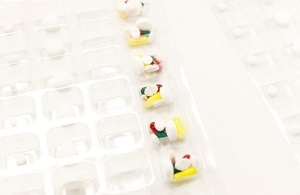New commitments in the fight against antimicrobial resistance
Professor Dame Sally Davies will become UK special envoy on antimicrobial resistance (AMR), and details announced on funding UK’s work in global fight against AMR.

Public Health Minister Seema Kennedy has confirmed the government will be retaining the world-leading expertise of outgoing Chief Medical Officer Professor Dame Sally Davies, as UK special envoy on AMR. Dame Sally will be working across all sectors to deliver a ‘One Health’ response to AMR, which includes health, agriculture and the environment.
Professor Dame Sally played a critical role in putting AMR on the global agenda, driving forward the UK’s world-leading strategy and advising the UN in her role as Co-Convenor for the Interagency Coordination Group on AMR.
Last year the government committed £32 million funding to accelerate the UK’s work in the global fight against AMR. Ten leading research centres across the country will now use the funding to explore new ways to inform prescribing and identify patterns of resistance.
The awarded funding will support the development of a state-of-the-art, virtual ‘open access’ centre that will link health outcomes and prescribing data. This technology, led by Public Health England (PHE), will gather real-time patient data on resistant infections, helping clinicians to make more targeted choices about when to use antibiotics and cutting unnecessary prescriptions.
PHE will use £5 million in funding to develop a fully functional model ward, the first of its kind in the UK, to better understand how hospital facilities can be designed to improve infection control and reduce the transmission of antibiotic-resistant infections.
Other successful funds include £4.4 million to Manchester University NHS Foundation Trust to test ‘individualised’ approaches to antibiotic prescribing by bringing together patient care and clinical research, and £3.5 million to the University of Liverpool to apply innovative genome sequencing to enable more personalised antibiotic prescribing.
Today’s announcement follows the government’s 20-year vision and 5-year national action plan published earlier this year, setting out how the UK will contribute to containing and controlling AMR by 2040.
Public Health Minister Seema Kennedy said:
Antibiotic resistance poses an enormous risk to our NHS – we are already seeing the harmful effect resistant bugs can have on patient safety in our hospitals. It is vital that we retain the irreplaceable expertise of Professor Dame Sally Davies – an international expert in AMR – and continue to invest in research.
This funding to prop up the facilities for novel ideas and technologies, supported by the continued leadership of Dame Sally, will play a vital role in helping us to tackle this threat.
Dr Susan Hopkins, Public Health England, said:
Innovation is critical to tackle the growing challenge of antibiotic resistance. With this investment we will be able to create the most sophisticated AMR data set globally, enhancing our ability to monitor AMR and design effective interventions to halt its rise. By increasing our laboratory capacity to study novel agents and the healthcare environment, we’ll be able to take bold steps to preserve antibiotics for when we really need them and improve care and outcomes for patients.
Professor Dame Sally Davies said:
AMR is a complex challenge which needs local, national and global action. The UK should be proud of its world-leading work on AMR. We have made tangible progress but it is essential we maintain momentum. I am honoured to have been asked to continue this vital work on behalf of the UK government.
Updates to this page
-
Added list of programmes funded.
-
First published.